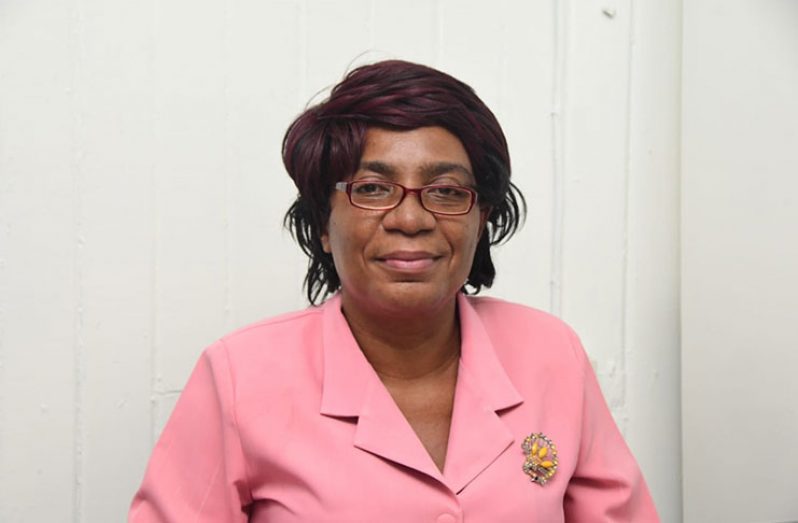–Nursing consultant says of the 500+ nurses trained in COVID-19 management
NURSES account for 50 per cent of the healthcare workers in Guyana, making them an integral partner in the fight against the Novel Coronavirus (COVID-19), which cannot be contained or managed unless frontline workers are well equipped with the requisite knowledge and tools.
The need for capacity building started last December when the first case of COVID-19 was detected in Wuhan, China, but the real work here began on March 11, 2020, when Guyana recorded its first case of the deadly disease. The woman, 52-year-old Ratna Baboolall, had, mere days before she died, returned to Guyana from the United States.
Since then, the number of recorded cases and deaths have risen to 125 and 10 respectively.
And while the local figures, coupled with the global figures are frightening, the real fear is knowing that there is no known treatment or cure for COVID-19. And it’s a fear that not just exists among the average Guyanese, but also at the level of frontline workers; people like the doctors and nurses who treat and manage patients on a daily basis.
“When the disease reached Guyana, the nurses were fearful, and some even decided not to work and instead just stay home,” said Nursing Consultant, Mandy La Fleur during an exclusive interview with the Guyana Chronicle.
La Fleur, who works with the Ministry of Public Health, was seconded to the Georgetown Public Hospital (GPHC) to aid in alleviating the existing fear and building the capacity of nurses to manage COVID-19.
The nursing consultant, who has over 30 years of experience in the field of nursing, “hit the ground running” and immediately organised training sessions, which focused on the management of COVID-19.
THE BIGGEST FEAR
The biggest fear most nurses had was of contracting the disease, and this was causing them to stay away from work or refusing to work directly with the hospital’s COVID-19 unit. This was a situation which needed immediate correction, said La Fleur, noting that her training sessions began with sensitising nurses about the mode of transmission.
“Once they understood it is a respiratory condition, and that unless their hands are contaminated and they don’t wear their PPE and decontaminate properly, they could get it, they started becoming less fearful, because it was just a matter of being cautious and following the established guidelines,” LaFleur said.
“The fear is relieved…we have seen this from the training, which also allowed us to understand the emotional state of our nurses because we got to hear about the anxiety and fear, which existed in their minds…there has definitely been a behavioural change,” she added.
Training sessions were not just extended to nurses attached to the COVID-19 Unit, but also to nurses who work in the Maternity Cardiac and Dialysis Units and other sections of the hospital.
While education is one form of motivation, the hospital administration also considered the physical protection and monetary compensation of nurses.
“We have a package for them; we provided housing for those persons working in the COVID-19 ICU, because they work four hours, and then they decontaminate after, go to the housing facility and back to the hospital… Food is also provided,” La Fleur said.
INCENTIVES
Nurses are also afforded a risk allowance, as financial security is important, and they also get access to transportation to and from home. Transportation is available to all health personnel who work for GPHC.
“We try to give them whatever they need, and with the training and package, we are actually seeing a decrease in absenteeism, because they understand the system…we have had nurses who came and just put down their names to work with COVID cases,” LaFleur said, adding:
“With what I am seeing, I believe we are getting to where we want to be; we are building capacity, boosting morale, and doing everything that can be done during this time.”
Nurses attached to other medical institutions have also benefitted from similar training sessions and packages organised by the public health ministry. So far, over 500 nurses have been trained, and plans are afoot to train even more as Guyana continues to wages its relentless battle against this silent killer of a disease.
According to Ms. LaFleur, all senior nurses across the country have been trained, and others will soon be afforded the same opportunity.
The World Health Organisation (WHO) had declared 2020 to be the “Year of the Nurse and Midwife” in celebration of Florence Nightingale, who would have turned 200 this year, had she still been alive. Across the globe, many organisations, professional associations, healthcare systems and other entities were poised to affirm this theme, and celebrate the many roles and contributions of nurses in advancing the health and welfare of people in every nation, but it was interrupted by COVID-19.
According to the WHO, it was completely unexpected that this would also be the year of an international health crisis; a pandemic that has now touched every level of society. Today, the entire world is grappling with the impact of the COVID-19 pandemic. And nurses are frontline in this environment.
On March 10, 2020, with some 180,000 cases and 4,000 deaths worldwide, the WHO declared the coronavirus outbreak a pandemic. This clarion call sent a message that everyone has a role in actively preventing further spread of the virus and seeking ways to protect those most at risk. This type of call to action is not new to nursing.
Throughout history, the nursing profession has played major roles in stepping into times of crisis and providing care and innovation that has saved lives and reduced suffering. This brutal COVID-19 situation will be no different, the WHO said.


.jpg)











